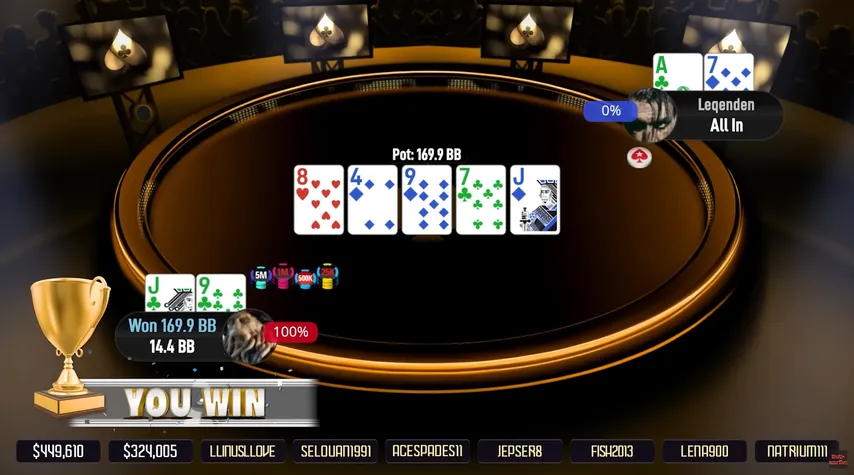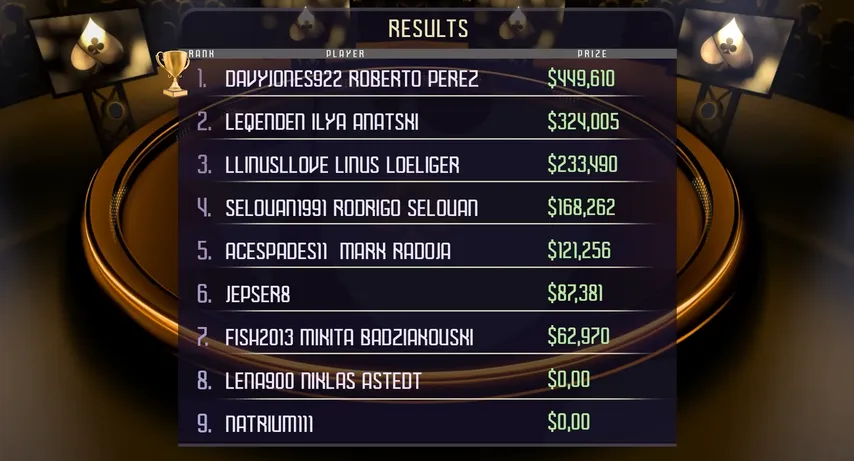Taking gameplay from a high-roller tournament on GGPoker, 2 Card Confidence seems very impressed by how the best cash regs adapt to MTTs.
LLinusLLove and DavyJones922 are two of the biggest cash game crushers, but how much does their cash knowledge help in a tournament against some elite MTT players? Can one of them win this $25,000 tournament for $450,000? In this tournament, we'll see players showcase one specific skill over and over again, and it's one that is completely underrated and not focused on enough. Let's see if you can catch it.
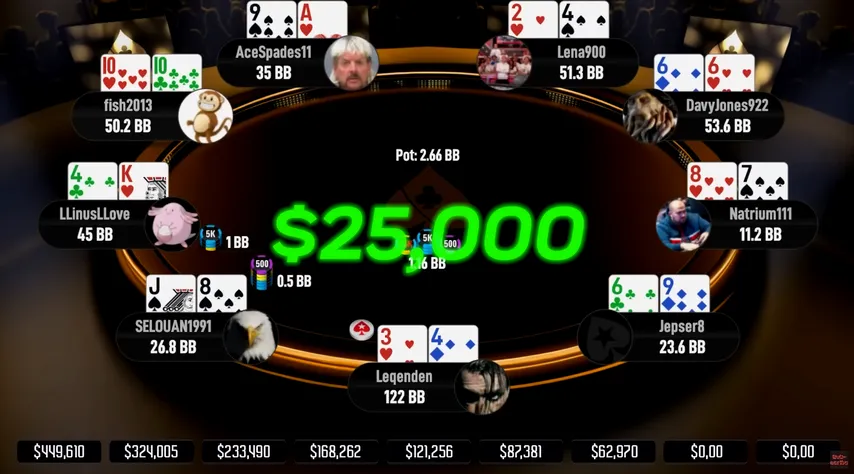
"fish2013", aka Mikita Badziakouski, is one of the most successful players in both cash games and tournaments, with $75 million in tournament cashes showing that tournaments have been his primary focus in recent years.
Still, this first round goes to cash game crusher Dave Jones.
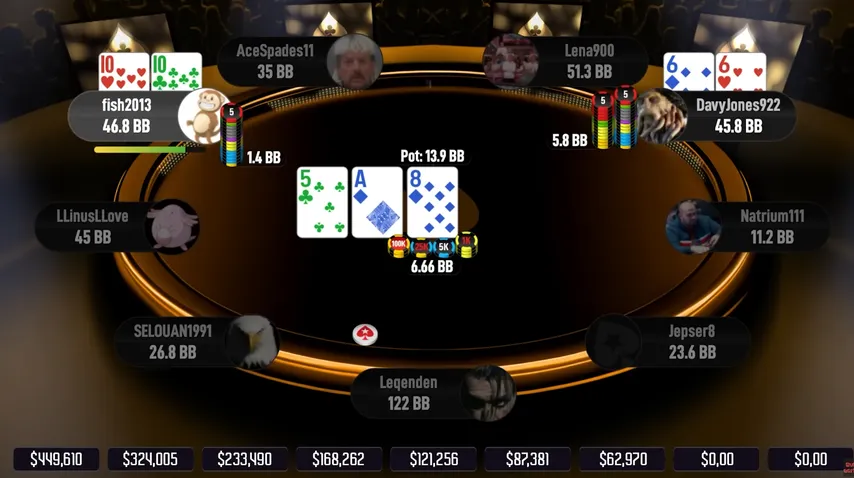
Not long after, Linus knocks on the door.
Is there any way for Makita to avoid losing his stack here?
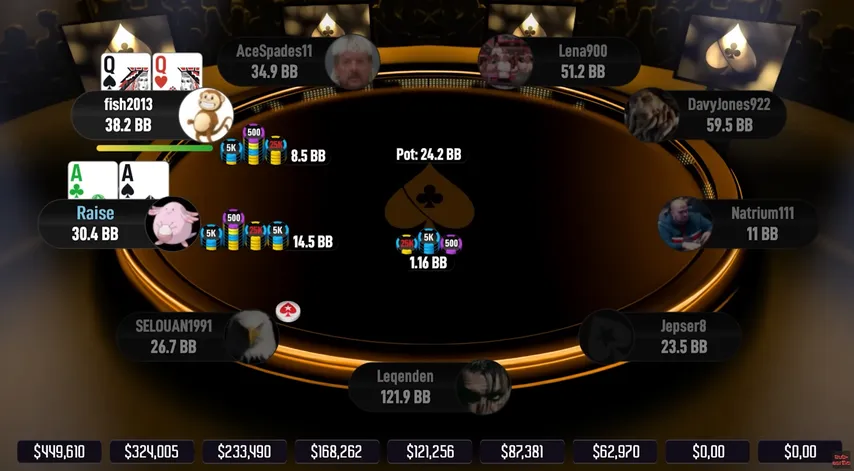
Well, if there is, then just calling the four-bet instead of jamming is one of the few ways to do so. If that call surprises you, you'll be even more surprised that in theory, pocket queens wouldn't even be a three-bet in the first place.
That's because when working with the limping range for the small blind—which is very reasonable to assume Linus will have here—the solver would limp most of his hands. Only a very polarized range would even open-raise, which would make pocket queens less profitable from three-betting as that filters out most worse hands while keeping in all better hands and hands with good equity against it. Even if we only allowed the small blind to open-raise and not limp, Queens would still mix calls and three-bets while generally maintaining a polarized range.
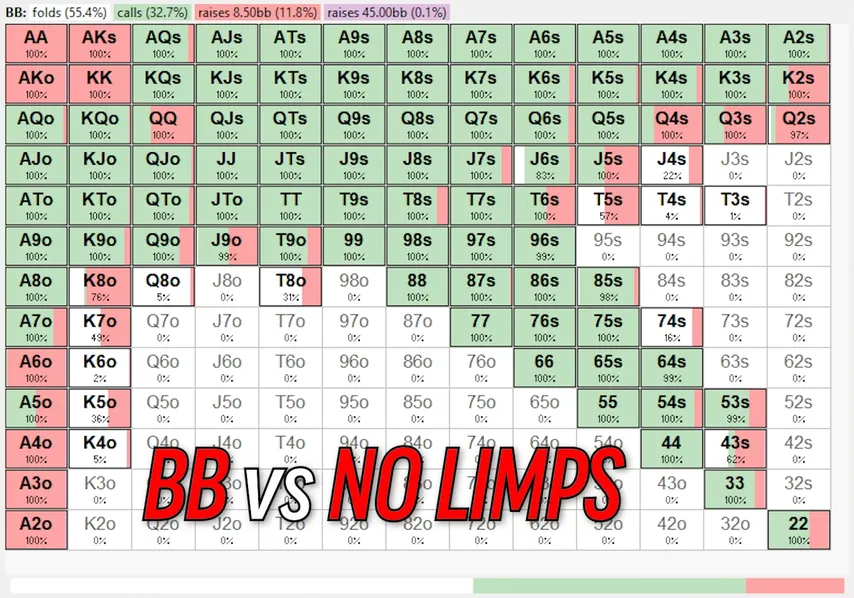
So just calling is probably the optimal play in reality when Lonus has a limping range. Still, just calling the four-bet instead of jamming allows you to look for a safe flop.
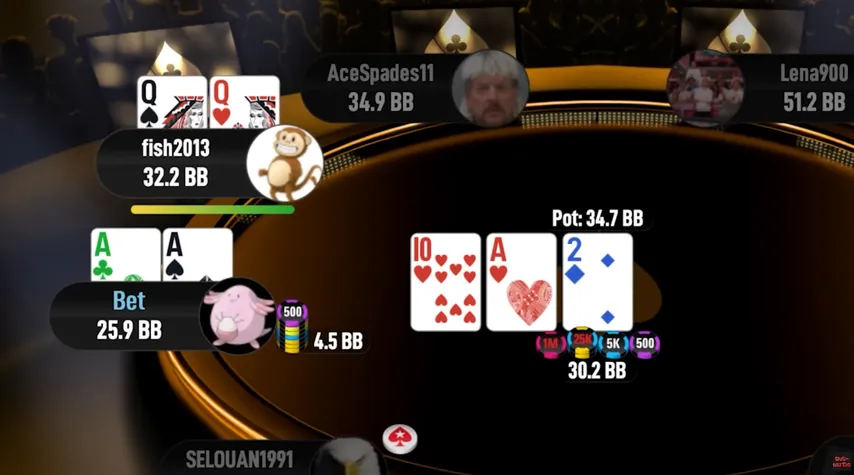
When the flop is not safe, you can still fold.
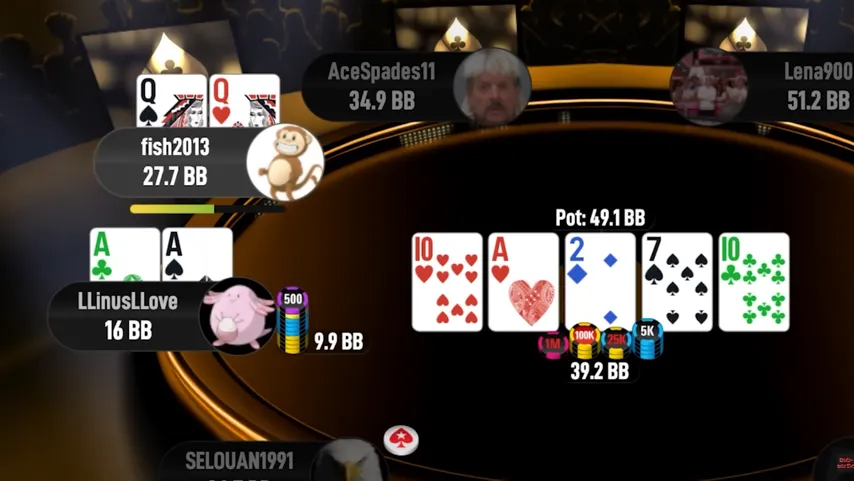
After we lose the first player, we see another battle between legends. This time, arguably the best tournament player alive cannot survive against DavyJones's better hand.
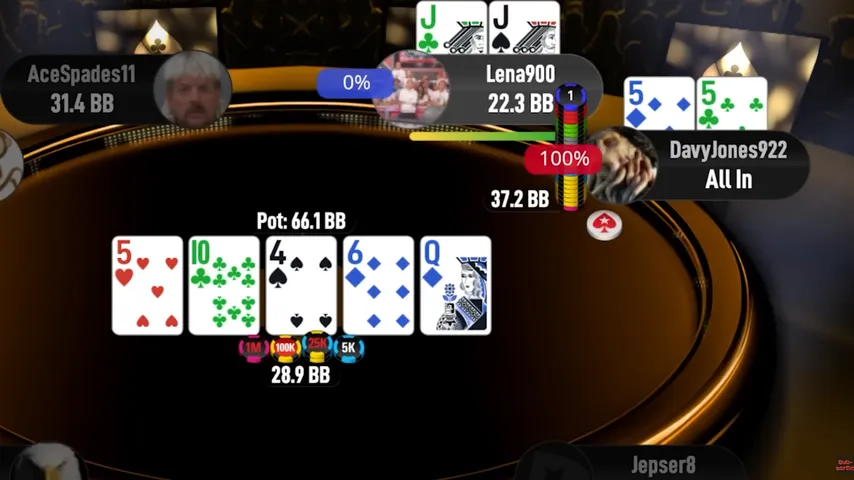
After a change of seats, we continue with some heat as the short stack at the table manages to get away from pocket tens against an open and a three-bet. This is not only GTO but also saves him from running into DavyJones's pocket queens, who then happily picks up the pot uncontested.
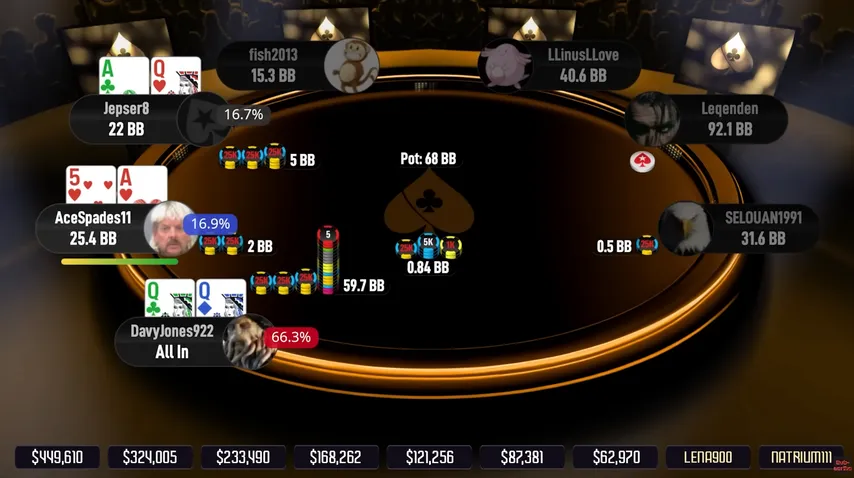
Back to Linus: King-Jack off is a clear defend against the min-raise from under the gun. He doesn't flop anything, but when the chip leader checks back the flop, a king is one of the best turns he can get.
Even still, he just check-folds.
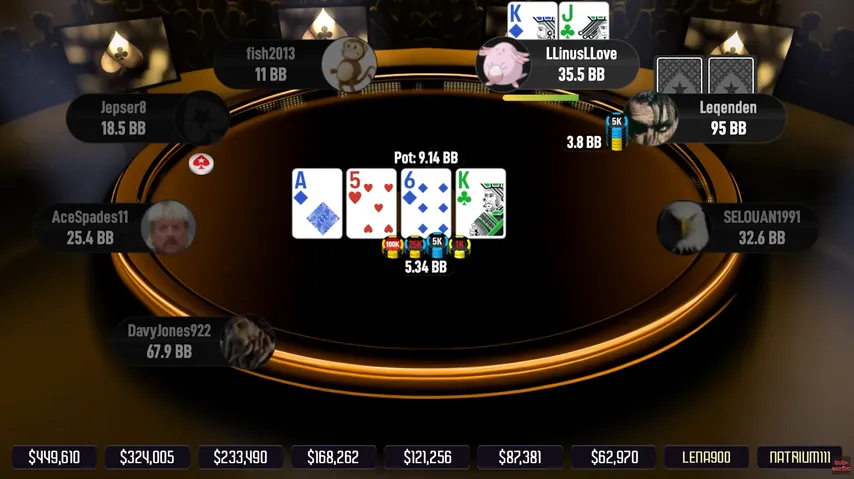
This might look surprising, but let's think about what Legenden's range might look like here. The fact that he bets 70% pot on the turn polarizes his range enough so that you shouldn't assume he has a better hand like King-X here; he would have either Ace-X or better or air.
On such a favorable flop for the chip leader—which is even a range bet for the solver—it's probably unlikely for him to check behind with pure air instead of just trying to take down the pot. When there are very few air hands that even arrive on the turn, the polarized range is likely lacking one of its poles. Even in theory, the solver would mix calls and folds with all King-X hands in Linus's shoes based on the premise that Legenden would bet hands like pocket tens through sevens for this size on the turn—which I think is rather unlikely. So folding King-Jack is not only theory-approved but also makes even more sense in practice.
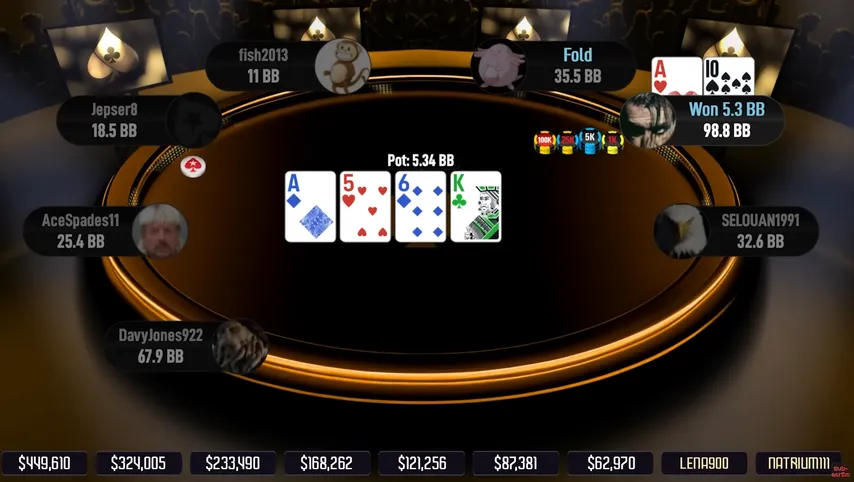
We lose another MTT legend and resume the battle between Linus and the chip leader again. Linus finds himself behind on the flop and again manages to find a nice fold on the turn.
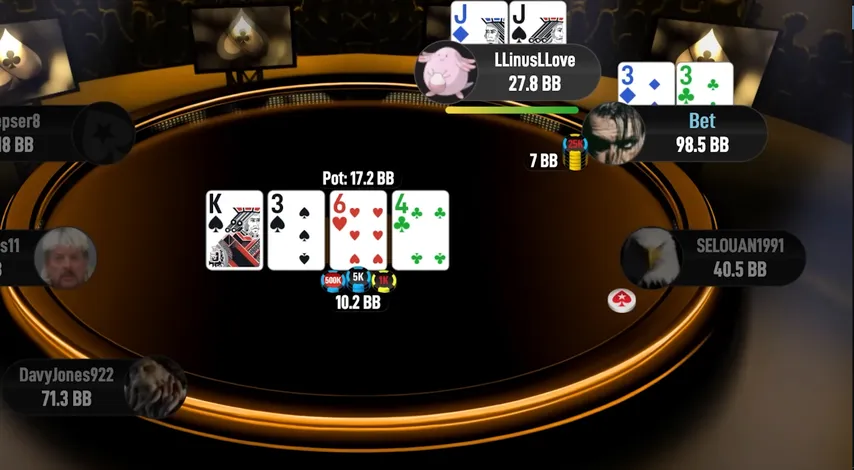
Meanwhile, David Jones does what an MTT player should be good at: winning flips.
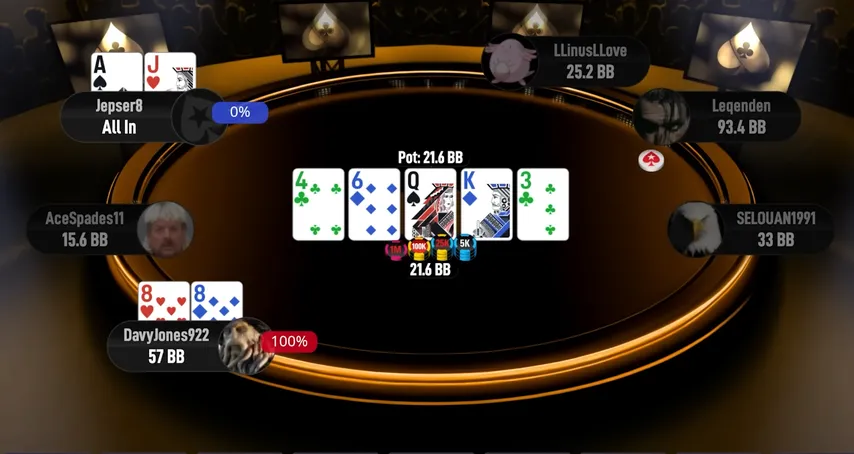
So far we've seen players make some great plays—plays that didn't win them chips but prevented them from losing a lot more than they did—which can be worth even more, especially in an MTT where your chips are your tournament life.
Let's see if David Jones can do the same. He flats against the chip leader, which is good, and flops top pair with an exception to the flop bet.
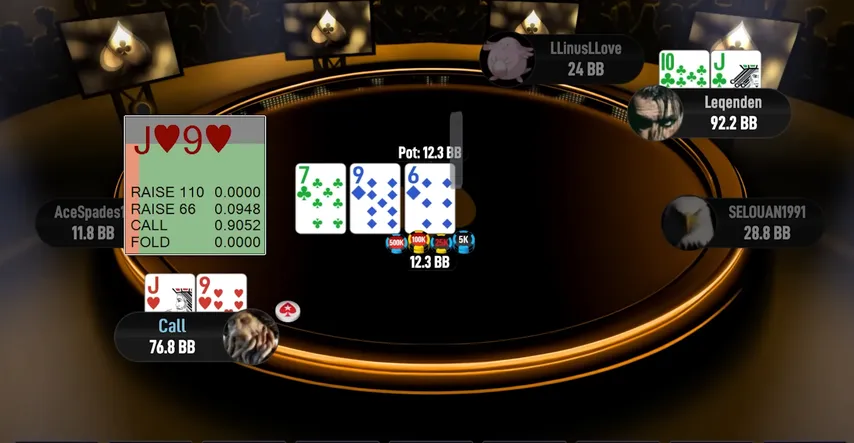
Both players' actions here are very much in line with GTO..
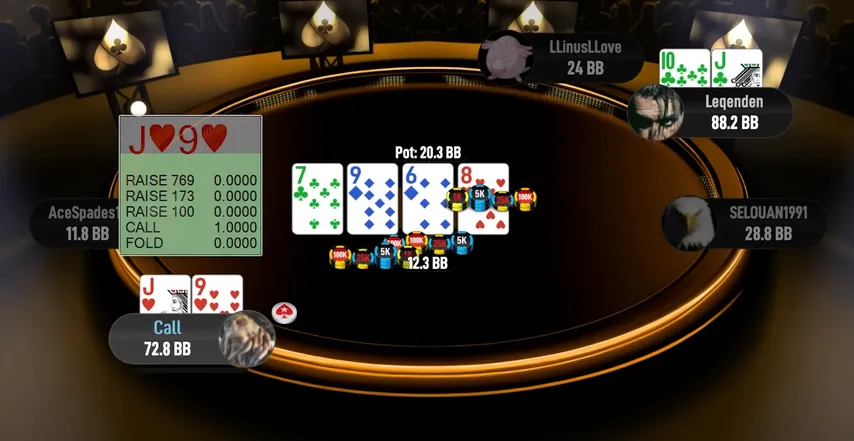
Until it goes to the river.
A 50% pot bet is actually the best sizing for this scenario with ; is a pure call. However, since the club combo represents a pure fold—as do many other hands—it tells us that this decision is likely very close in theory, and Dave's instincts seem to tell him, here, in reality, it's a fold.
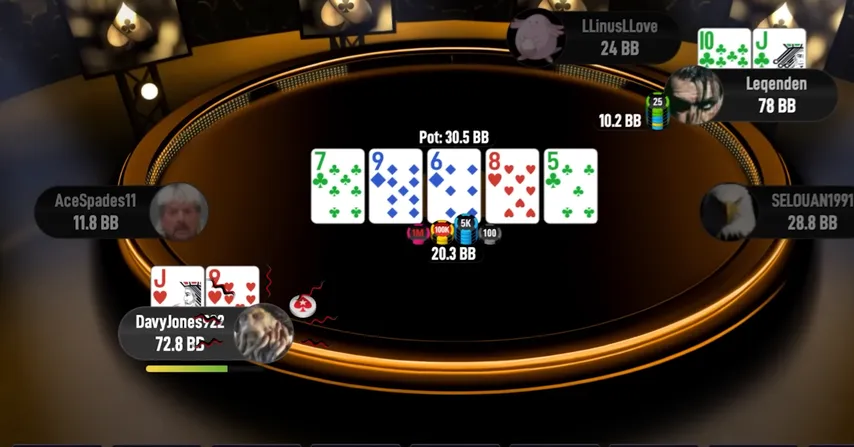
With ten big blinds saved by making this great fold, he goes into another round with the chip leader.
With Queen-Jack, the flop would mostly be bet small, but betting big isn't a crime.
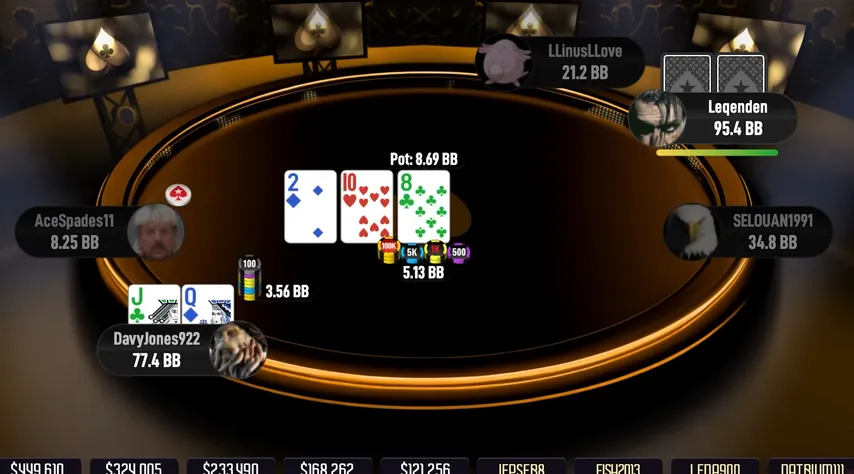
Going for a big pot bet on the turn is much appreciated by the solver. On the river, with a blocker should be a nice hand to bluff with, right? Well, only less than 5% of the time, considering we have so many other off-suit hands that include Jack, Queen, King, and even better Ace of clubs. We have to remember to keep our bluffing frequencies and check.
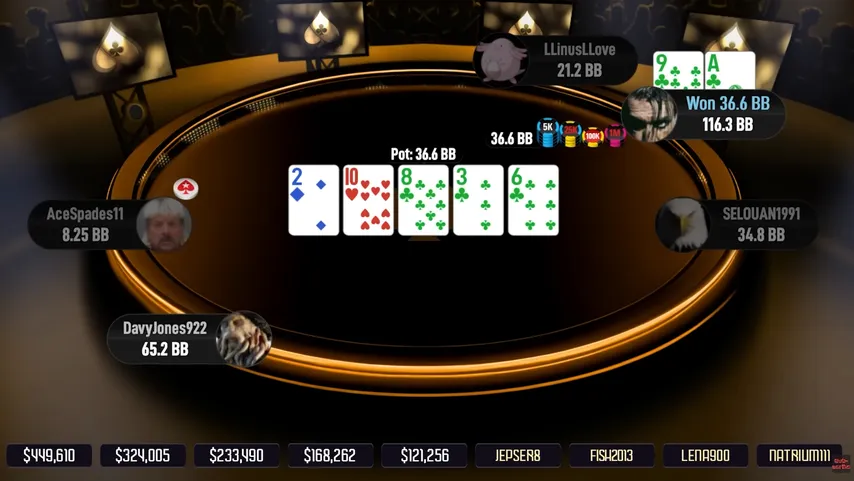
This brings us to one of the most interesting hands at this final table. Linus opens with King-Queen suited, and Legenden calls with King-Five suited. Here we see that limping is even more prevalent than in the earlier spot. If we ask the solver, it would virtually limp its entire range—including King-Queen suited. However, since that is apparently not the case here in practice, we'll make our lives easier and just work with the small blind's range that would only play a raise-first-in-no-fold strategy where King-Queen suited would always open and King-Five would always call.
We see a King-high flop with only 22 big blinds. Linus bets less than 25% pot and gets called—both of which are standard plays.
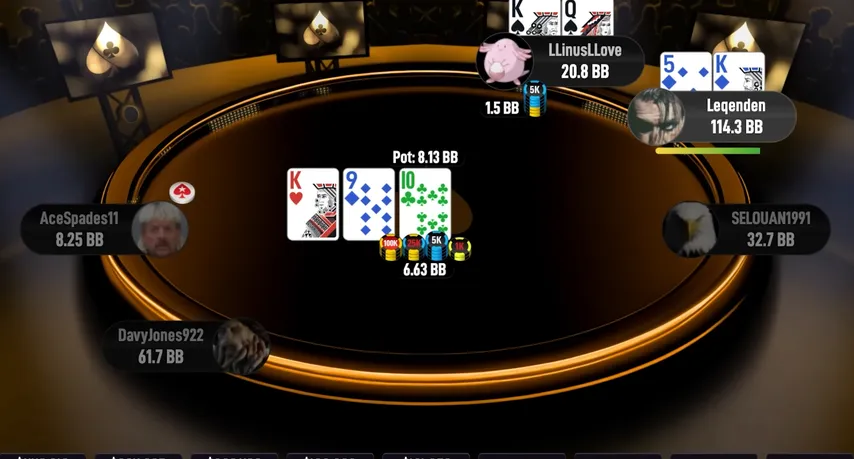
On the turn, Linus can bet again, and a small size is exactly what makes the most use of his overall range advantage. It allows him to value bet thinner and limits the amount of chips he plays for, which is important when it's easy to lose all of them quickly.
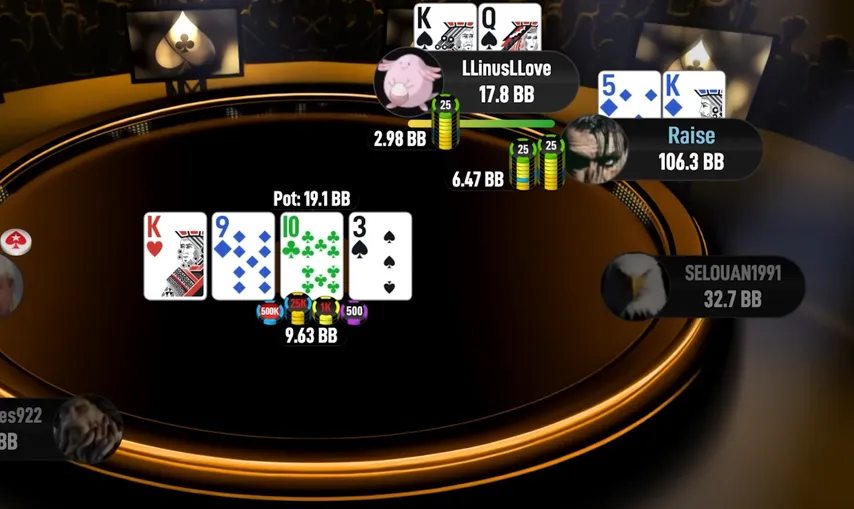
A raise like this would happen sometimes but never with King-Five. The worst value hand that would raise more often than it would call here would be . Besides that and some hands like or , there are also a decent amount of bluffs that could do this—hands like , , , and . Against that range, clicking it back would be what the solver would do one-third of the time.
Like, really often.
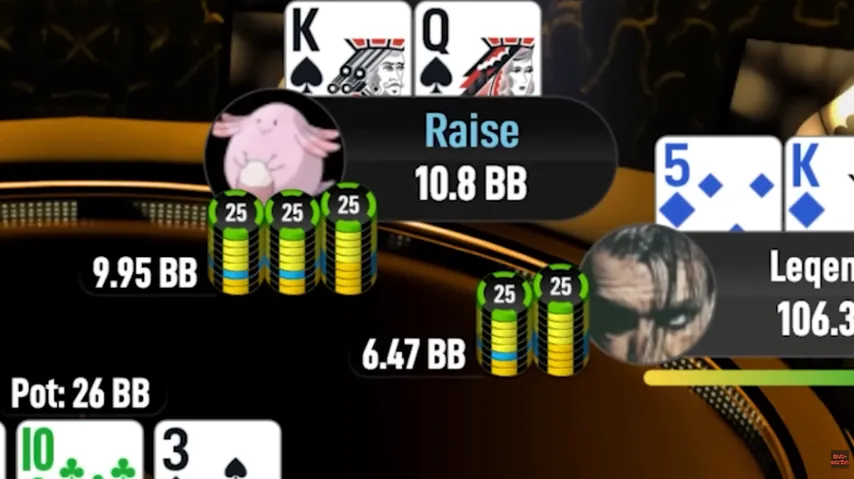
Since King-Five would never raise on the turn, we can't compare Legenden's play to the solver directly. However, the closest hand to it—King suited—would always call. The river brings a , which shuffles things up again. Linus makes a straight; as would a large part of his range that three-bet on the turn, in theory. More than 50% of his hands would be straights here, while the big blind would have less than 30% straights in this range.
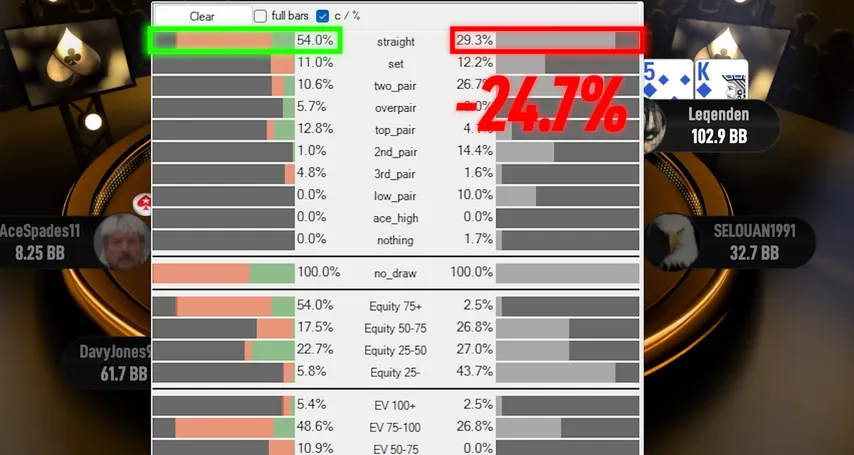
With such a large range and nut advantage, Lonus can definitely bet. The interesting part is how much; despite having only one-third pot left, the solver would prefer a 10% pot bet and never jam all-in. This is the impact that ICM (Independent Chip Model) has on optimal strategy because ICM optimizes to have a player lose their entire stack as rarely as possible so they can ladder up and win more money. Without ICM considerations, the solver would only care about making the most chips in the long run without considering any prize money.
So if we solve this river spot without including ICM, the solver would basically only have an all-in jam instead of betting 10%. When a cash game player knows this much about ICM, can he really just be considered a cash game player?
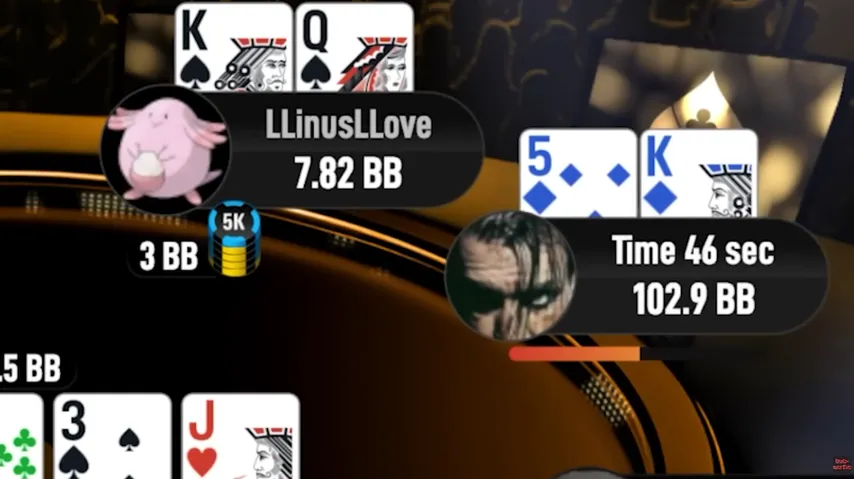
Another tournament player has to go, leaving two cash game racks against two tournament racks. We resume our most frequent battle; after Selouan1991 busts as well, we are now at two-to-one in favor of cash versus MTT pros.
And, the outcome we've seen so often. DavyJone dodging bullets like Neo.
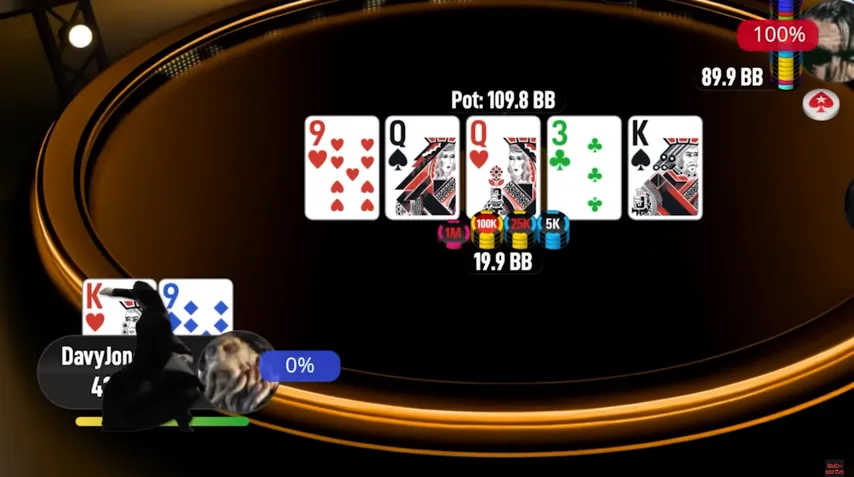
Legenden then takes a shot against Linus and wins the flip, opening the stage for an ultimate cash game versus tournament crusher heads-up match.
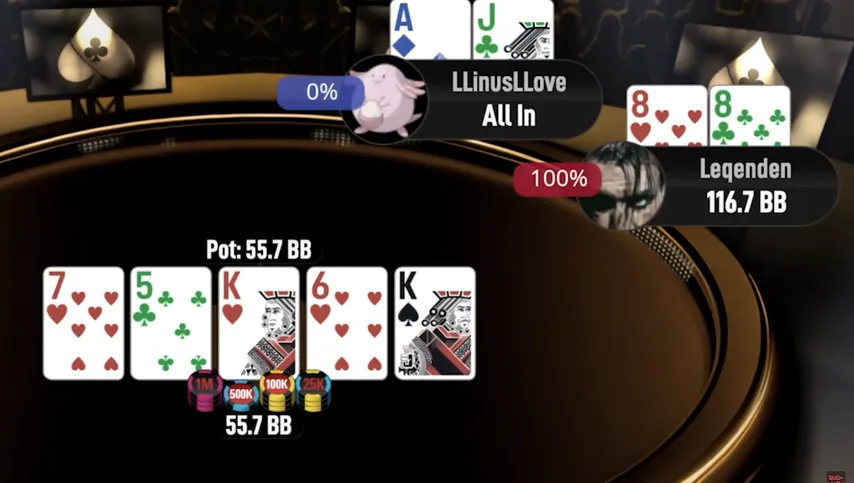
Here we'll witness one of the most epic heads-up performances I have seen. It starts off with some action.
DavyJones three-bets Ace-Jack suited against Queen-Ten offsuit and c-bets his top pair on . His range wants to see-bet only one-third of the time here, but basically, any hand could mix in a bet.
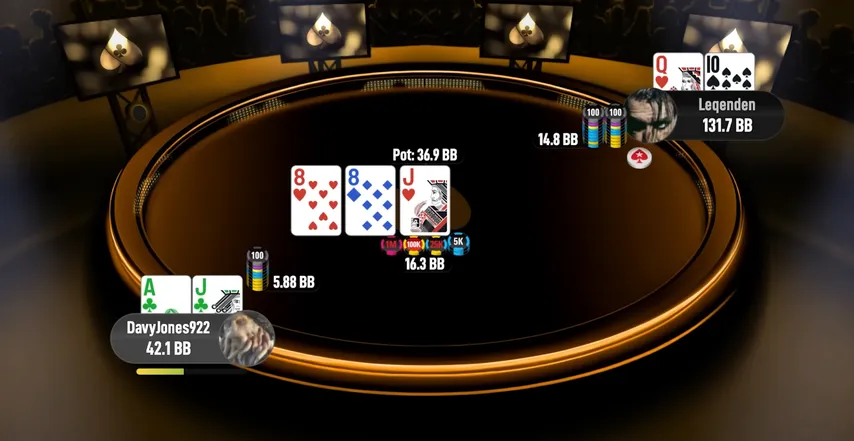
Legenden, who has one , decides to bluff-raise; he might try to represent having an ace or jack that wants to protect against overcards or maybe even slow-play an overpair. The solver doesn't like this play with this hand and would rather raise hands with more equity (like flush draws) or less equity (like pure Ace-highs). But overall, the raising frequency is very, very low.
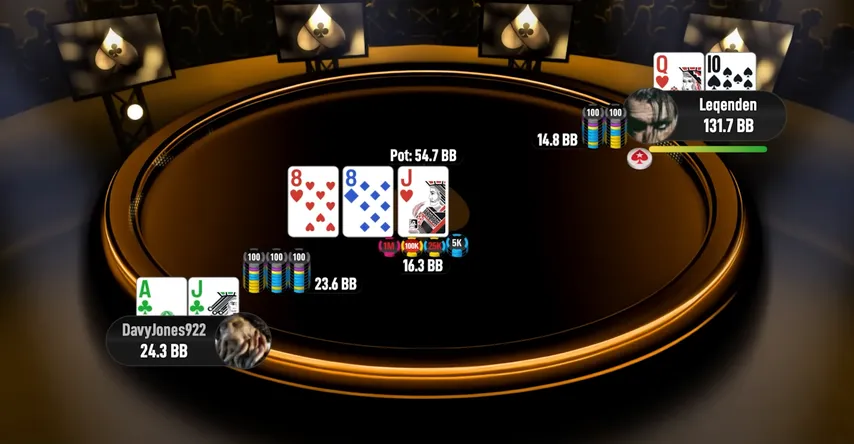
Davy then goes ahead and clicks it back, which is exactly what the solver would do. It benefits from getting value from weaker while also preventing hands that have overcards and/or weak draws—just like —from realizing their equity.
The next hand is just pure odd. Davy opens and checks back on a flop with three . On the turn, Legenden leads for one-third pot, which is a valid bet, and is a clear call.
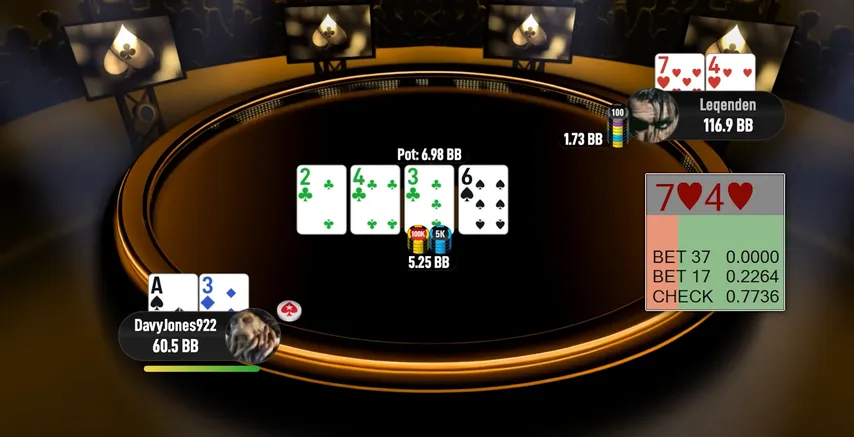
The river now presents a clear check for , as it's too weak to value bet and too good to bluff. , on the other hand, is still good enough for a value bet, even though the board looks very scary with both flushes possible as well as a one-card straight. That's because the big blind's range is still very wide in this spot after calling the pre-flop raise, betting small on the turn, and checking the river there are still many pairs that can bluff-catch— , , , , and even would be calling. According to the solver,
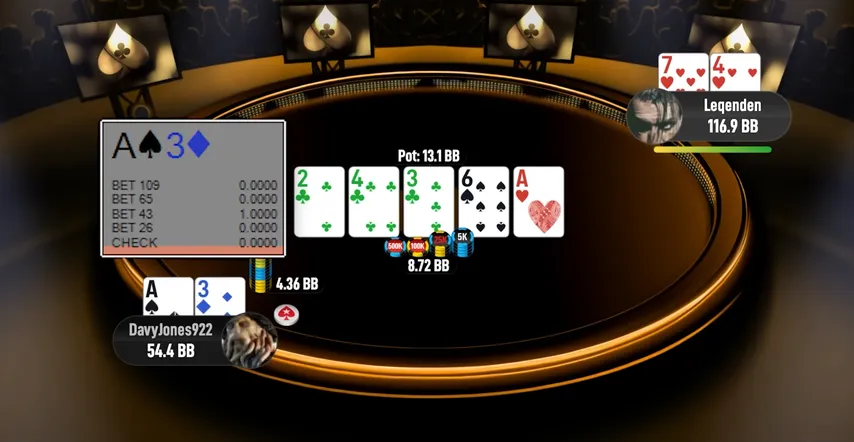
specifically would actually have to fold, but since the very next best hand ( ) and every other would be calls, it cannot be a big mistake to call here. However, raising is a different story. In theory, there would be plenty of bluff raises happening, just as there would be a lot of value raises. But every check-raise bluff would have to include a because the blocker allows for the most fold equity. Raising with other hands on top will likely lead to over-bluffing by a huge amount, which is a bad idea when Davy Jones isn’t having it.
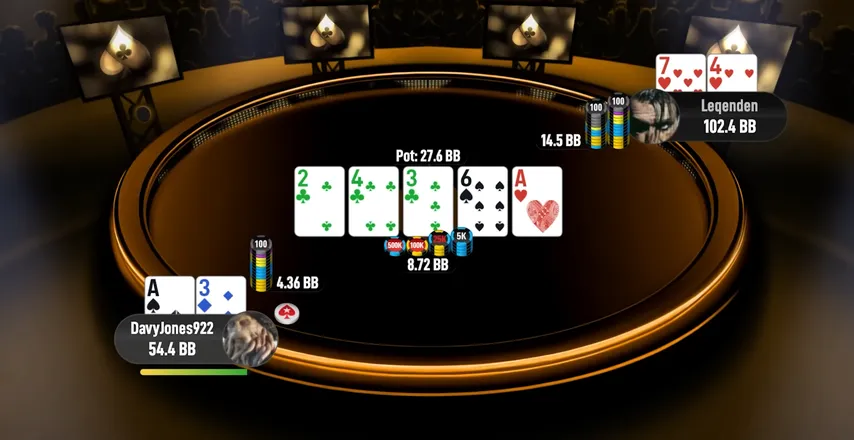
What we witnessed at this final table—not only from DavyJones but also from Linus, Mikita, and other elite players—is that getting away from hands that could easily be justified as standard coolers while protecting your tournament life is one of the most important skills in MTTs.
Even more impressive is when the player that has been practicing this the most at this final table switches it up to make extremely difficult calls exactly at the right time.
